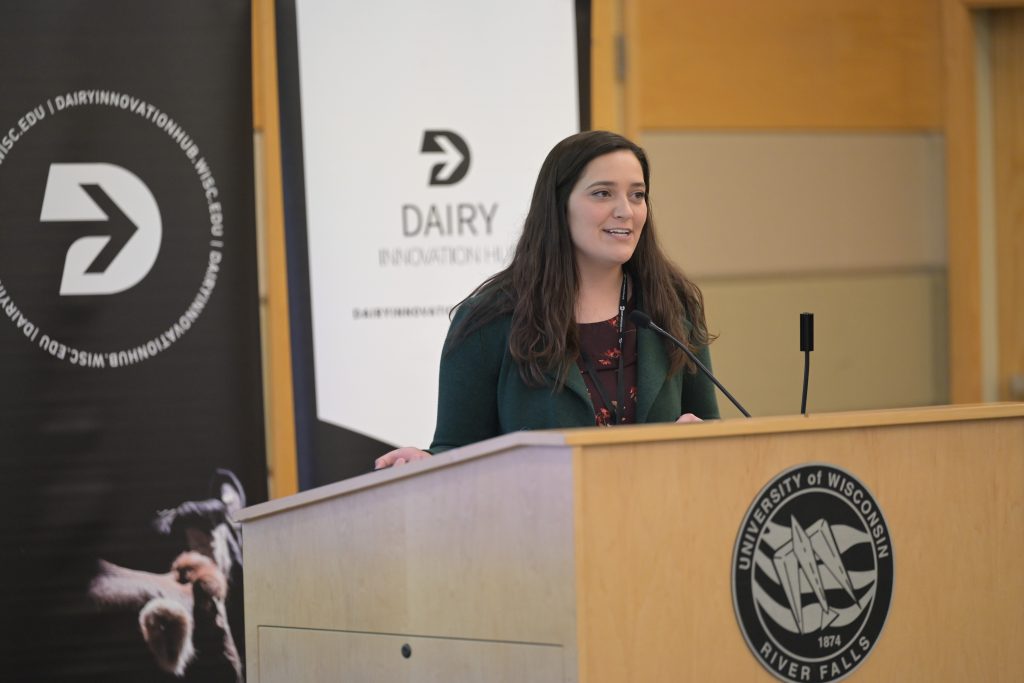
Kaylee Reisgraf speaks during the 2022 Dairy Summit event hosted by UW–River Falls. Photo by Pat Deninger/UW–River Falls
For the past two years, Kaylee Riesgraf has worked as a dairy nutritionist, helping farmers in rural Wisconsin achieve their goals. Before beginning her professional career, Riesgraf was a graduate student at the University of Wisconsin–Madison, and the first student funded by the state-sponsored Dairy Innovation Hub. Her path from calf chores to cattle consulting embodies the core mission of the Hub: to support students who demonstrate innovation, leadership, and a strong dedication to Wisconsin’s dairy community.
Early life on the farm
Riesgraf’s story begins on her family’s 1,000-cow dairy, A&L Lisowe Acres, located near New Holstein, Wisconsin. Founded by her great-grandfather, the farm has grown through four generations of family ownership and continues to operate today. Kaylee’s mother, a part-owner of the farm, manages the calves and heifers, an area Riesgraf naturally gravitated toward as a child.
From a young age, Riesgraf was immersed in the rhythms of farm life, helping with calf chores before school and on weekend mornings. “While I never appreciated the hard work until I left for college, growing up with farm responsibilities teaches a great deal of work ethic and teamwork,” she shared.
Undergraduate journey at UW–River Falls

When it came time to choose a college, Riesgraf found an immediate sense of belonging at the University of Wisconsin–River Falls. “It immediately felt like home,” she recalled. “I loved the small campus with the old red-brick buildings and worn stone steps that so many generations had walked on before me.” What truly stood out to her was the close-knit community, professors who knew students by name, and classmates who shared similar farm backgrounds.
Riesgraf began her college journey to become a large animal veterinarian. But as she spent more time shadowing vets, particularly women in the profession, she started to reflect on her own lifestyle goals. “I realized that career path doesn’t always allow the flexibility and family time I desired,” she said.
Everything changed during her junior year, when she confided in her advisor, Steve Kelm, about her uncertainties. That conversation opened the door to something new: the possibility of graduate school rather than vet school.
Kelm recalled the shift vividly: “From the very beginning, it was clear that she was bright and curious. She had the opportunity to complete undergraduate research on our campus, and that was a pivotal experience for her as she became very interested in research and the pursuit of a graduate degree.”
From uncertain beginnings to innovative research
Riesgraf’s shift from aspiring veterinarian to graduate student researcher didn’t happen overnight. Letting go of a long-held dream was difficult. However, UW–Madison was looking for a student from UW–River Falls to participate in a collaborative research project funded by the newly launched Dairy Innovation Hub, and Kelm knew Riesgraf would be a great fit.
Still, she had her doubts. “I was very skeptical and nervous about studying at a bigger university in the ‘big’ city of Madison,” she said. After meeting with Kent Weigel from UW–Madison once… then twice… she still wasn’t sure. But during their third meeting, Weigel encouraged her to add her name to the research proposal. When the Dairy Innovation Hub approved the project, the decision was made. “I was all in and excited to be part of the project,” Riesgraf said.
As her graduate advisor, Weigel quickly noticed her remarkable drive and confidence. “Riesgraf is a self-starter, and if you discuss what you’re trying to accomplish, explain why it is important, and offer a rough outline of how to do it, she will figure out the rest and get the job done,” he shared. “And she seems to be fearless. For example, when I asked her if she would speak to the UW Board of Regents about the Dairy Innovation Hub, she was like “Sure, I can do that, no problem.”
At UW–Madison, Riesgraf quickly embraced hands-on research supported by the Hub, focusing on how early-life stressors impact dairy replacement heifer performance. Guided by Weigel, she led two key studies alongside a collaborative research team.
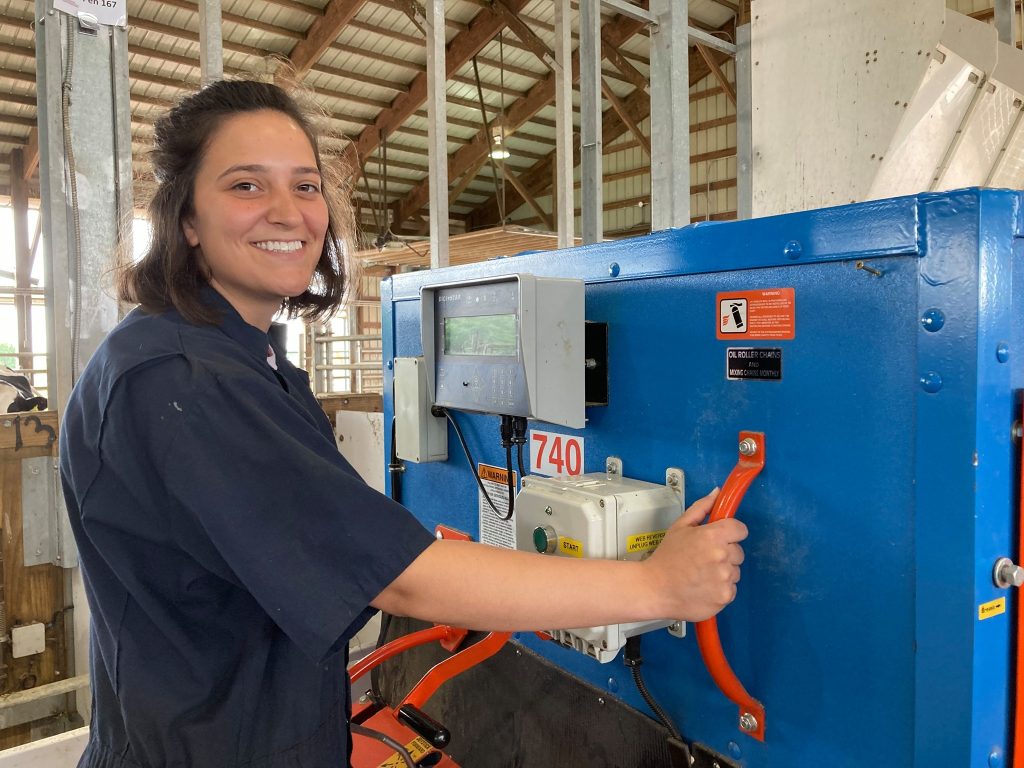
The first project examined the effects of in utero heat stress using data from heifers whose dams were exposed to intense heat in Florida during late pregnancy. Riesgraf evaluated how these stressors impacted growth, feed efficiency, and methane emissions. The second project looked at the long-term effects of social housing, specifically, whether calves raised in pairs versus individually showed performance differences as they matured.
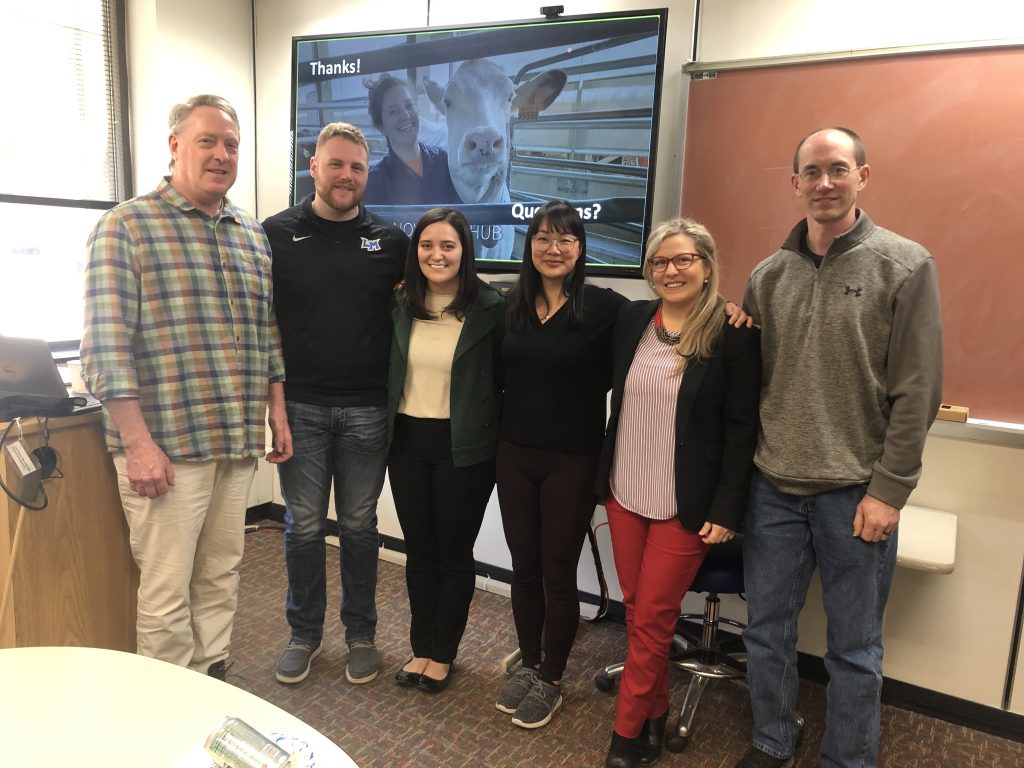
One of the most exciting tools Riesgraf used was a GreenFeed system to measure methane emissions. “We found that heifers pair-housed from birth to weaning were still heavier later in life, with no negative effects on feed efficiency or methane emissions,” she said. “In our second study, we found no feed efficiency, growth, or methane production differences between heifers that were heat stressed or thermoneutral in utero. This data supported the idea that despite being significantly smaller at birth, in utero heat-stressed heifers undergo compensatory gain.”
Weigel highlighted the positive implications: “We found little difference in their growth, body size, or feed efficiency at that point in life, which is good news, because it indicates that dairy heifers seem to have the ability to recover from stressful early life events without significant permanent impacts on their performance.”
Throughout the process, Riesgraf learned to navigate the complexity of interdisciplinary research. She worked with five different professors across a wide range of specialties, including behavior, heat stress, nutrition, genomics, and data analysis. “I quickly learned it is so much faster to go to the professor or graduate student that specializes in that area and simply ask for help.”
Life after graduation: career as a nutritionist
After earning her master’s degree in May 2023, Riesgraf knew she wanted to stay connected to dairy cows and the farmers who care for them, but she wasn’t quite sure what that would look like. She explored a few different options, including pursuing a PhD, before deciding on a new career path: dairy nutrition.
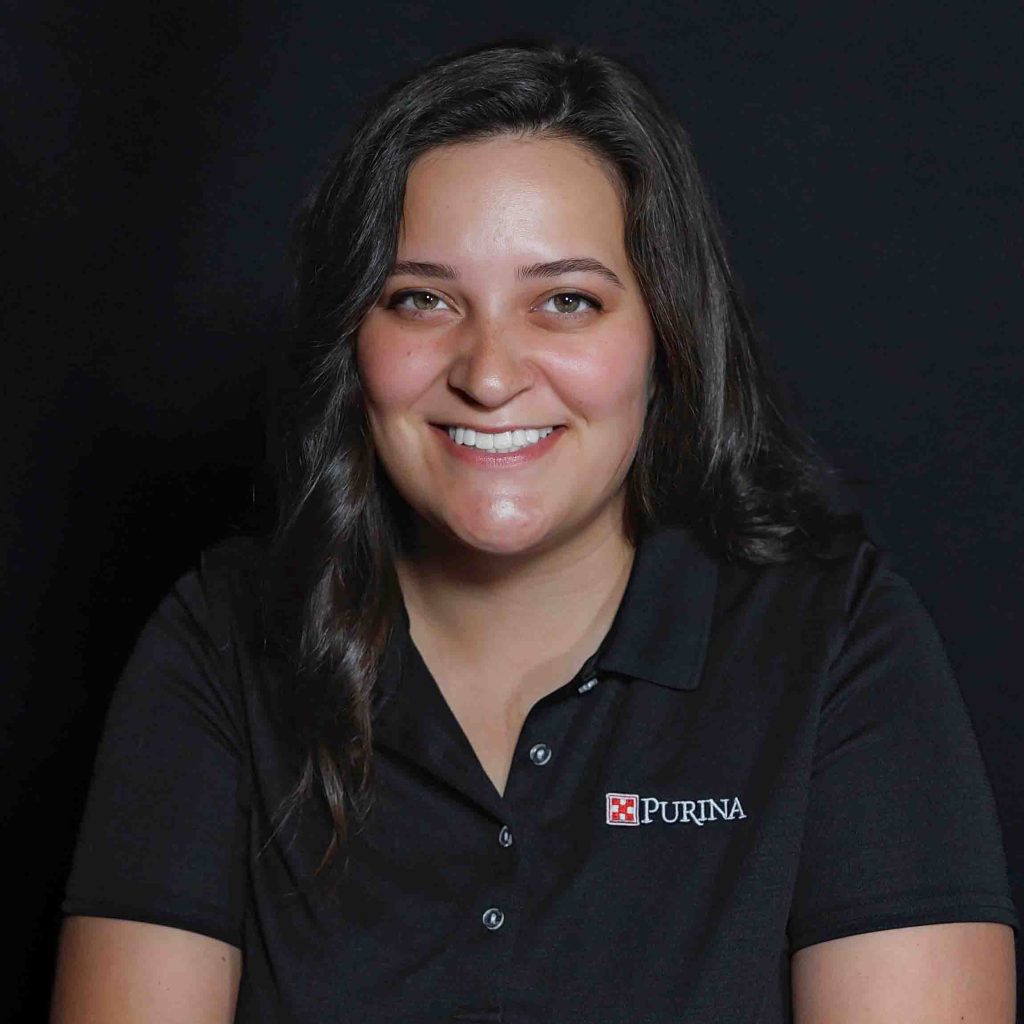
“My goal was to be in a role that allowed me to be on-farm with cows and provide value to farmers,” she said. “Nutritionists do so much more than build diets for cows, we are problem-solvers, advisors, and sometimes therapists.”
A peer who graduated a year earlier shared Riesgraf’s contact with potential employers, leading her to Purina/Land O’Lakes. Now a dairy nutritionist in rural Wisconsin, Riesgraf’s role blends data and hands-on work, from walking pens and sampling feed to analyzing herd records. But the heart of her job lies in the conversations she has with farmers.
“My professional training has taught me that each farm is different and there is no cookie-cutter solution,” Riesgraf explained.
While she no longer works in a lab, Riesgraf carries the tools of graduate school with her every day. “More than the specific research I did, I use the skills I gained in graduate school,” she said. “I am able to comprehend research articles, perform data analysis, and ask good questions.”
Riesgraf today
Riesgraf is thriving, both on the farm and at home. She and her husband, Jacob, who met at UW–River Falls, will celebrate their fourth wedding anniversary in May 2025. Now living in Menomonie, Wisconsin, they welcomed their daughter, Finlee, just months after Riesgraf completed her master’s degree.
Balancing motherhood and her role as a full-time dairy nutritionist hasn’t always been easy, but Riesgraf embraces it with dedication and heart. Outside of work, she has been enjoying playing pickleball with the Menomonie Pickleball Club.
Whether she’s offering nutrition advice or sharing a laugh with farmers, Riesgraf values building real relationships. “I talk with farmers about cows and nutrition, but also about my husband, daughter, and hobbies,” she said. “I genuinely want to know the people behind the cows.”
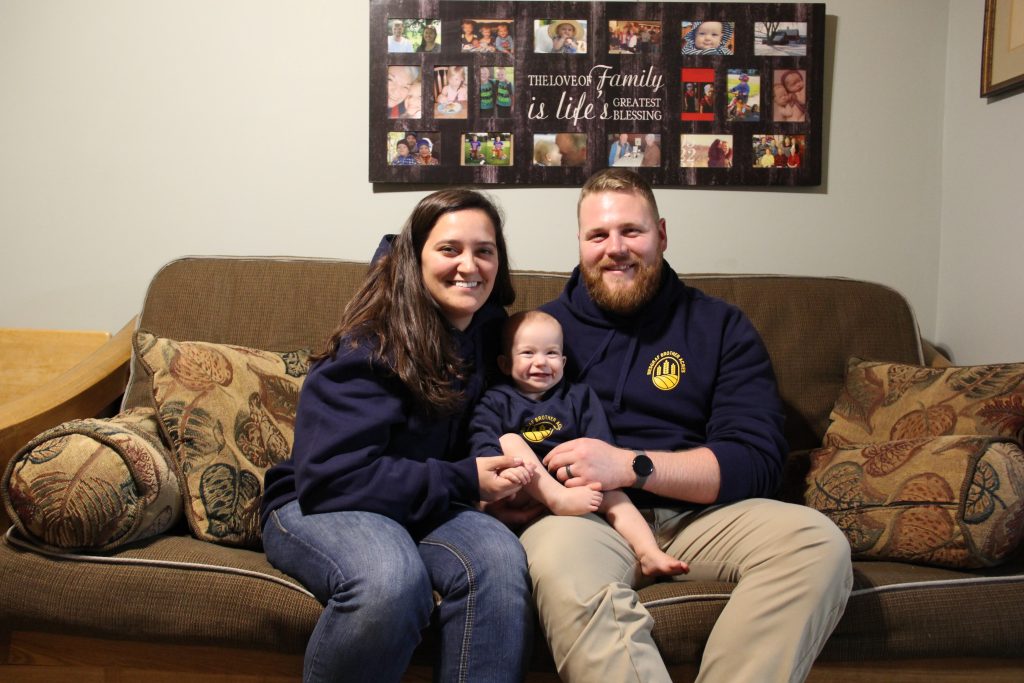
Looking ahead
As she looks to the future, Riesgraf remains grounded in her passion for dairy farming. “My goal is to continue learning and become a more valuable resource and problem-solver for farmers,” she said.
Her long-term vision includes continuing to build roots in her local community. She and Jacob hope to someday purchase a home and some land in one of the surrounding rural townships, where they can raise their daughter.
By staying curious, resilient, and open-minded, Riesgraf has found a path that lets her make a difference, one farm visit at a time.
